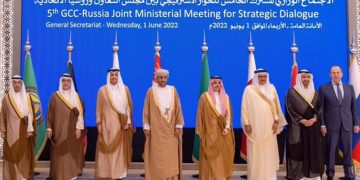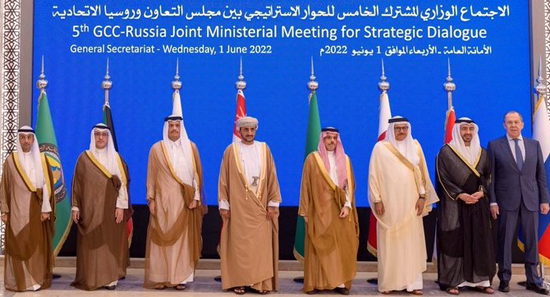Arab News
Last week’s twin meetings between the Gulf Cooperation Council foreign ministers and officials from Russia and Ukraine provided an opportunity to clarify the GCC’s position on the Russia-Ukraine conflict and explore avenues for cooperation with the two countries. The bloc enjoyed close economic ties with both before the crisis erupted in February. The GCC countries all voted in favor of the UN General Assembly resolution on March 2, when they joined 135 other nations in demanding an end to Russia’s operations in Ukraine.
Following last week’s meetings, the GCC issued its quarterly press statement, which included several sections representing its members’ collective position on the conflict. This position is based on the principles of international law, the UN Charter and the need to “preserve the global system based on respect for a state’s sovereignty, territorial integrity, political independence, non-interference in its internal affairs, and refraining from the use of force or threats thereof to resolve international disputes.”
The GCC ministers expressed support for mediation efforts to resolve the crisis and called for a cessation of hostilities and for dialogue to resolve the crisis politically. Some individual member states have offered to mediate such talks. The GCC voiced concern about the devastating effects of the crisis on the people of Ukraine, as well as the negative security repercussions in Europe and around the world, including on food supply chains.
The ministerial meetings with Russia and Ukraine took place on the same day — June 1 — but were held separately under the rubric of GCC strategic dialogue with each of the two warring parties. The GCC signed a memorandum of understanding on strategic dialogue with Russia in November 2011 and the two sides have, since then, engaged in regular discussions to expand their partnership in all areas. A similar agreement was signed with Ukraine in November 2017 during then-President Petro Poroshenko’s visit to Riyadh and the two sides have been working on a draft joint action plan to implement that agreement. Last Wednesday’s meetings, while focused on discussing the current crisis between the two neighbors, also sought to explore possible avenues for cooperation between the GCC and each of the two countries.
Saudi Foreign Minister Prince Faisal bin Farhan chaired the GCC side in both meetings, which were also attended by foreign ministers from the other GCC states. Ukraine was represented by Andriy Yarmak, head of President Volodymyr Zelensky’s office, and Dmytro Kuleba, its foreign minister. Foreign Minister Sergey Lavrov headed the Russian delegation.
There was a special focus at the two meetings on the impact of the crisis on food security, especially its devastating effects in the Middle East and North Africa and in other countries that are dependent on imports from Russia and Ukraine. According to the World Bank, these two countries account for 29 percent of global wheat exports, 62 percent of sunflower oil and significant shares of other necessary food products. The conflict has exacerbated food price inflation in emerging markets and developing economies, affecting the poorest and most vulnerable communities. This crisis came on top of a global food supply system that was already fragile from two years of COVID-19 disruptions, droughts, currency devaluations and worsening fiscal constraints. Countries with a high share of wheat imports from Ukraine and Russia have been hardest hit, including MENA states that depend on wheat from the Black Sea region because of its proximity and the fact that wheat is their main staple food. According to the World Bank, the highest immediate risk is to those countries still awaiting shipments for the second half of the year, such as Egypt, the world’s largest importer of wheat, which is waiting for 6.6 million tons. Turkey imports 4 million tons, Bangladesh also close to 4 million tons, and Iran imports 1.7 million tons. Others, such as Lebanon, Tunisia, Yemen, Libya and Pakistan, have also been affected. Concerned about food shortages in neighboring countries as a result of the closure of export facilities in Ukraine, the GCC ministers last week declared their strong support for “all efforts” aimed at facilitating the export of food and other humanitarian supplies from Ukraine.




